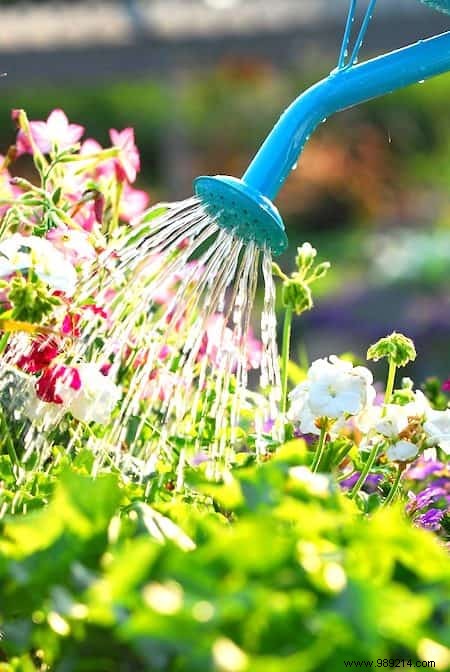
Yes, yes, you read that right!
You can really use hydrogen peroxide in the garden.
Plus, there are loads of benefits to using it. Why?
Because hydrogen peroxide (H2O2) has an additional oxygen atom compared to water (H2O).
It's that extra atom of oxygen that makes hydrogen peroxide so useful in the garden.

Usually, hydrogen peroxide is used for cleaning, bleaching clothes, sterilization or disinfection...
...but hydrogen peroxide can also be used in horticulture.
The reason is simple, hydrogen peroxide (10 volumes) acts as an oxygen supplement for plants.
Without further ado, here are 6 uses for hydrogen peroxide in the garden that no one knows about:

If you water a plant too much, the roots no longer have enough oxygen. Why ? Because the water invades all the empty spaces and smothers the roots. And it goes very quickly, because it only takes 24 hours for the plant to begin to wither. To save a plant that has been overwatered and whose roots are beginning to rot, water it with a solution of hydrogen peroxide. For this, mix 3 ml of hydrogen peroxide per liter of water. The oxygen present in the hydrogen peroxide will give the roots an oxygen boost so that the plant can survive. After this watering, stop watering until the soil dries.

Did you know that you can stimulate seed germination with hydrogen peroxide? Why ? Because hydrogen peroxide softens the film that surrounds the seed. It also eliminates the bacteria on this film that could infect the young plant. This has the effect of accelerating the rate of germination. To do this, soak your seeds in 10 volume hydrogen peroxide for 1/2 hour. Then rinse them several times with water and plant them as usual.

This trick is known to horticulturists and rose growers to avoid mildew, mold and fungi. To do this, mix 10 tablespoons of 10 volume hydrogen peroxide in 1 liter of water. Then, spray this solution on your plants as a preventive or as a treatment until the disappearance of the fungus.

Use hydrogen peroxide to strengthen the roots of your plants. The extra oxygen molecule present in hydrogen peroxide helps plant roots better absorb nutrients from the soil. To do this, mix 1 teaspoon of hydrogen peroxide in about 4 liters of water. You can use this formula from time to time to stimulate growth.

Yes, hydrogen peroxide can also be used as a pesticide. To do this, carefully spray the plant with a mixture of equal parts water and hydrogen peroxide at 10 volumes. This will eliminate the parasites and their eggs. This mixture also kills bacteria that grow on fruits and vegetables. Very effective against the cabbage worm for example.

Keep the water in ponds or fountains clean by adding 250 ml of hydrogen peroxide per 30 liters of water. Algae and bacteria will no longer grow in this purified water. Convenient and easy, right?